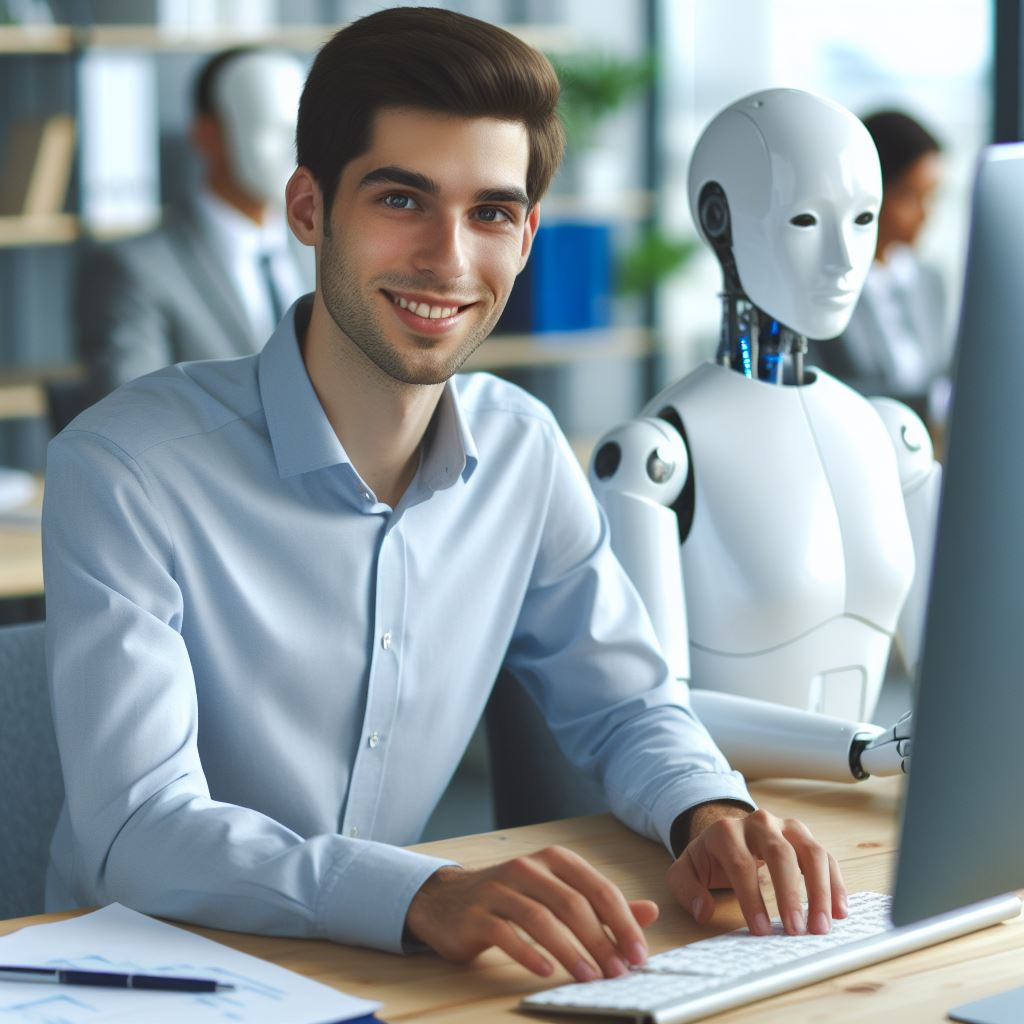Introduction
Artificial Intelligence (AI) is revolutionizing industries, automating tasks and creating opportunities for growth.
AI-proof careers are positions that are less likely to be replaced by automation or AI technology.
As AI technology advances, the impact on the workforce is becoming more apparent.
Having skills that are AI-proof is crucial for job security in the future.
Industries such as healthcare, finance, and education are already seeing significant changes due to AI.
Workers in traditional roles are now facing the risk of being replaced by AI technology.
Adapting to this shift requires individuals to develop skills that are in high demand.
Jobs that require creativity, critical thinking, and emotional intelligence are less likely to be automated.
AI-proof careers offer stability and security in a rapidly changing job market.
As AI continues to evolve, investing in skill sets that are resilient to automation is essential.
Understanding AI’s Impact on Employment
Statistics and forecasts about job displacement due to AI advancements
As technology continues to advance at an exponential rate, the impact of AI on employment is becoming more pronounced.
According to statistics and forecasts, many jobs are at risk of being displaced by AI in the near future.
Examples of careers and tasks already being replaced or augmented by AI
For example, in industries such as manufacturing, transportation, and customer service, AI technology is already replacing human workers in tasks that can be automated.
This trend is likely to continue as AI becomes more sophisticated and capable of handling complex tasks.
However, it is important to note that not all jobs are at risk of being replaced by AI.
In many cases, AI technology is being used to augment and enhance human capabilities, rather than completely replacing them.
For instance, in the healthcare industry, AI is being used to analyze medical images and data, allowing doctors to make more accurate diagnoses and treatment plans.
This not only improves patient outcomes but also frees up time for healthcare professionals to focus on other important tasks.
Difference between job augmentation versus job replacement
It is crucial for individuals to understand the difference between job augmentation and job replacement when considering the future of their careers.
While some jobs may be at risk of being automated by AI, there are also opportunities for new roles to emerge that require human skills and creativity.
Transform Your Career Today
Unlock a personalized career strategy that drives real results. Get tailored advice and a roadmap designed just for you.
Start NowOverall, it is clear that AI technology will continue to have a significant impact on the workforce in the coming years.
By staying informed about the latest trends and developments in the field of AI, individuals can position themselves for success in AI-proof careers that offer job security and growth opportunities.
Read: Next Decade’s Top Careers: A Forecast
The Nature of AI-Proof Careers
What makes a career AI-proof
In today’s rapidly evolving technological landscape, the concept of AI-proof careers has gained significant traction.
What makes a career AI-proof is the emphasis on skills that are uniquely human, such as creativity, emotional intelligence, and complex problem-solving.
These skills require a level of nuance and intuition that AI, with all its advancements, still struggles to replicate.
The importance of human touch in certain professions that AI can’t replicate
Professions that heavily rely on human touch, such as healthcare providers, therapists, and social workers, are inherently AI-proof.
The essence of empathy and understanding that these professions demand is deeply rooted in the human experience.
AI may be able to process vast amounts of data and perform complex calculations, but it lacks the emotional intelligence required in certain human-centric roles.
Moreover, creativity is another key factor that sets human workers apart from AI in terms of job security.
Professions like artists, writers, designers, and innovators rely on the ability to think outside the box and come up with novel ideas.
These creative endeavors are driven by human imagination and intuition, making them significantly harder for AI to master.
Additionally, complex problem-solving is a critical skill that AI struggles to excel at in certain scenarios.
Dealing with unpredictable and non-linear challenges often requires a level of adaptability and critical thinking that AI is still working to achieve.
In essence, careers that blend creativity, emotional intelligence, and complex problem-solving are more likely to be AI-proof in the long run.
These professions leverage uniquely human qualities that are challenging for AI to replicate or replace.
As technology continues to advance, the importance of human touch in certain professions becomes even more evident.
Ultimately, the blend of technical skills and human-centered capabilities will be key to ensuring job security in the age of AI.
Read: Future-Ready Careers: What’s Next?
Categories of AI-Proof Careers
Creative Professions
Within the realm of creative professions lie a multitude of roles that tap into the depths of human imagination.
Transform Your Career Today
Unlock a personalized career strategy that drives real results. Get tailored advice and a roadmap designed just for you.
Start NowArtists, with their ability to translate emotions onto canvas, writers who weave intricate narratives, and designers who sculpt the digital and physical worlds, all share a common trait: creativity.
This innate human quality is notoriously challenging for AI to replicate.
While algorithms can analyze existing works and generate outputs based on patterns, they struggle to capture the essence of originality and the nuanced understanding of human emotions that drive creativity.
The subtleties of artistic expression and the intuitive leaps made by creative minds remain firmly within the domain of human consciousness.
Healthcare and Personal Care
In the healthcare sector, the roles of doctors, nurses, therapists, and personal care aides extend far beyond the realm of technical expertise.
At the heart of their practice lies human empathy and decision-making.
While AI can assist in diagnosing illnesses and analyzing medical data, it falls short in understanding the complex emotional needs of patients and making empathetic decisions tailored to individual circumstances.
The ability to connect with patients on a human level, provide comfort, and make ethical judgments based on empathy and intuition are indispensable qualities that render healthcare professions resistant to automation.
Technical and Scientific Innovation
The pursuit of innovation and scientific discovery thrives on human ingenuity and intuition.
Researchers, engineers, and scientists push the boundaries of knowledge, exploring uncharted territories and finding solutions to complex problems.
While AI can augment these processes by analyzing vast datasets and performing repetitive tasks, the spark of creativity and the ability to make intuitive leaps remain uniquely human.
The serendipitous discoveries, the flashes of insight, and the creative synthesis of disparate ideas are hallmarks of human innovation that elude the grasp of artificial intelligence.
Education and Training
In the field of education and training, the role of educators goes beyond the dissemination of information.
Teachers, corporate trainers, and education consultants play a pivotal role in shaping minds and fostering growth.
Personalized learning experiences tailored to the needs and interests of individual learners are crucial for effective education.
While AI can provide adaptive learning platforms and personalized recommendations, it lacks the depth of understanding and human connection necessary to truly motivate and inspire learners.
The encouragement, mentorship, and emotional support provided by human educators are invaluable components of the learning process that AI cannot fully replicate.
In general, the categories of AI-proof careers encompass a diverse range of professions that rely on uniquely human qualities such as creativity, empathy, intuition, and personalized interaction.
While AI continues to advance, these fundamental aspects of human endeavor remain firmly within the realm of human capability, ensuring the enduring relevance and job security of these professions in the face of technological disruption.
Read: The Regulation of Professions: A Closer Look
Transform Your Career Today
Unlock a personalized career strategy that drives real results. Get tailored advice and a roadmap designed just for you.
Start Now
Building an AI-Proof Career
Strategies for professionals to future-proof their careers against AI
In today’s rapidly evolving job market, the rise of artificial intelligence (AI) has raised concerns about the future of work.
Many fear that AI will replace human workers in various industries, leaving them jobless.
However, there are steps professionals can take to build an AI-proof career.
- Lifelong Learning: Continuous education and upskilling are essential in staying ahead of AI technology.
Professionals should seek opportunities to learn new skills and stay updated on industry trends. - Adaptability: Being flexible and adaptable to change is crucial in an AI-driven workplace.
Professionals must be willing to evolve with technology and adapt to new roles and responsibilities. - Continuous Skill Development: While AI excels at tasks that are repetitive and rule-based, human skills such as creativity, critical thinking, and problem-solving remain valuable.
Professionals should focus on honing these skills to remain relevant in the workforce.
The importance of developing soft skills, such as empathy, leadership, and communication
Soft skills are attributes that enable effective communication, collaboration, and interpersonal relationships.
In an AI-dominated world, skills like empathy, leadership, and teamwork become increasingly important as they are difficult for machines to replicate.
- Embracing Change: Instead of fearing AI technology, professionals should embrace it as a tool to enhance their work.
By leveraging AI to automate tasks and improve efficiency, professionals can focus on higher-value activities that require human intuition and creativity. - Networking and Building Relationships: Connecting with peers, mentors, and industry experts can provide valuable insights and opportunities for collaboration.
Building a strong professional network can open doors to new opportunities and help professionals stay informed about industry developments. - Staying Curious and Open-Minded: Curiosity and a willingness to learn are essential traits for adapting to change and thriving in an AI-driven world.
Professionals should stay curious, ask questions, and explore new ideas to remain agile and innovative in their careers.
By following these strategies and focusing on continuous learning and skill development, professionals can future-proof their careers against AI and thrive in an ever-changing job market.
Read: The Importance of Professional Careers
The Role of Education and Government Policy
How education systems and government policies need to adapt to prepare the workforce for an AI-dominated future
Education systems and government policies play a crucial role in shaping the future workforce in an AI-dominated world.
It is imperative that educational institutions revamp traditional curricula to emphasize skills that cannot be easily automated.
Proposals for new educational models focusing on creativity, critical thinking, and emotional intelligence
Creativity is a key attribute that sets humans apart from AI, and it should be nurtured from an early age.
Encouraging critical thinking skills can help individuals analyze complex problems and come up with innovative solutions.
Emotional intelligence, the ability to understand and manage emotions, is essential for effective communication and collaboration in the workplace.
Government policies should incentivize companies to invest in training programs to upskill their employees and adapt to new technologies.
There is a need for collaboration between industries, educational institutions, and governments to ensure a smooth transition to an AI-driven economy.
Creating apprenticeship programs that combine on-the-job training with classroom instruction can help bridge the skills gap in emerging industries.
Investing in lifelong learning programs can enable individuals to stay competitive in the job market and adapt to changing technological trends.
Overall, a proactive approach from both the education sector and government is essential to ensure job security in an increasingly AI-driven world.
Conclusion
The landscape of work is rapidly evolving due to the integration of AI technologies.
To thrive in this ever-changing environment, it’s imperative to cultivate adaptability.
This entails continuously updating skills, embracing new technologies, and fostering a mindset of lifelong learning.
Transform Your Career Today
Unlock a personalized career strategy that drives real results. Get tailored advice and a roadmap designed just for you.
Start NowThe notion of AI-proof careers doesn’t mean resisting technological advancements but rather mastering them.
While AI may automate certain tasks, it cannot replicate human creativity, critical thinking, and emotional intelligence.
Therefore, professions that require these uniquely human qualities are likely to remain resilient in the face of automation.
It’s crucial to recognize that staying adaptable isn’t just about acquiring technical skills; it’s also about nurturing soft skills such as communication, collaboration, and empathy.
These skills enable individuals to navigate complex interpersonal dynamics and effectively engage with clients, colleagues, and stakeholders.
As we look to the future, the importance of adaptability cannot be overstated.
Industries will continue to undergo transformation, and new job roles will emerge while others become obsolete.
Those who remain agile and open to change will be best positioned to capitalize on emerging opportunities and navigate uncertainties.
In light of this, I encourage readers to take proactive steps to assess their career paths. Reflect on your strengths, passions, and areas for growth.
Consider how you can align yourself with future-proof roles that leverage your unique combination of skills and expertise.
By embracing change, seizing opportunities, and investing in your personal and professional development, you can not only survive but thrive in the age of AI.
Remember, the future belongs to those who are adaptable.
[E-Books for Sale]
The Big Book of 500 High-Paying Jobs in America: Unlock Your Earning Potential
$19.99 • 500 High-Paying Jobs • 330 pages
Explore 500 high-paying jobs in America and learn how to boost your career, earn more, and achieve success!
See All 500 High-Paying Jobs of this E-Book
1001 Professions Without a Degree: High-Paying American Jobs You Can Start Now
$19.99 • 1001 Professions Without a Degree • 174 pages
Discover 1001 high-paying jobs without a degree! Unlock career tips, skills, and success strategies for just $19.99!




